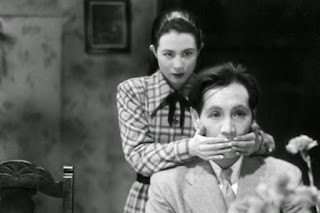 As it is in its now 166 minute format (the longest version available), it is still an incredibly important piece of melodrama. After the devastation of the war, Kinji Kameda (Masayuki Mori) and Denkichi Akama (Toshiro Mifune), travel back to a remote island. Kameda claims that he suffers from an illness, cause by the suffering of war, and simply referred to as idiocy - when expressed on film, this idiocy seems simply to be an innocent, and fundamentally naive view of people. He simply only sees good in people, even if this is not the case. On arriving they both seem to fall for a disgraced woman, Taeko Nasu (Setsuko Hara), who was someones concubine since the age of fourteen, and is being offered for marriage at a price.
As it is in its now 166 minute format (the longest version available), it is still an incredibly important piece of melodrama. After the devastation of the war, Kinji Kameda (Masayuki Mori) and Denkichi Akama (Toshiro Mifune), travel back to a remote island. Kameda claims that he suffers from an illness, cause by the suffering of war, and simply referred to as idiocy - when expressed on film, this idiocy seems simply to be an innocent, and fundamentally naive view of people. He simply only sees good in people, even if this is not the case. On arriving they both seem to fall for a disgraced woman, Taeko Nasu (Setsuko Hara), who was someones concubine since the age of fourteen, and is being offered for marriage at a price.What ensues is a strange love triangle that divides not only the two male protagonists, but the community. The film is beautifully shot in black and white by Toshio Ubukata, who had worked with Kurosawa on his previous film, Scandal (1950). It is unfortunate that the films first half suffers so evidently due to extensive cutting. However, it is the relationship between Kameda and Akama that provides the climax (which is seemingly more intact) that provides the films central theme, and its most poignant elements.
Directed by: Akira Kurosawa
Starring: Setsuko Hara, Masayuki Mori, Toshirô Mifune, Yoshiko Kuga
Country: Japan
Rating: ****
Marc Ivamy

No comments:
Post a Comment